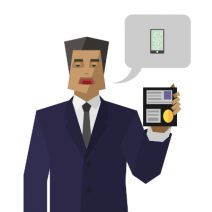BNMC Blog
Is Apple in the Right to Refuse the FBI?
 Apple has been a major contributor to advancements in computing over the past few decades. Their iPhone was the first commercially available smartphone, and they continue to innovate with new and exciting consumer technology. However, one of Apple’s most recent decisions might be one of the most important for today’s cyber security world.
Apple has been a major contributor to advancements in computing over the past few decades. Their iPhone was the first commercially available smartphone, and they continue to innovate with new and exciting consumer technology. However, one of Apple’s most recent decisions might be one of the most important for today’s cyber security world.
The decision in question refers to the encryption protocol used on Apple’s iPhones, and one device in particular: the iPhone used by the shooter in the San Bernardino, California terrorist attacks of December 2015. The FBI has issued a court order to Apple, asking them to provide and/or build a backdoor for iOS, in an attempt to garner information from the device used in those attacks. This request, and Apple’s vehement refusal, could set a precedent into motion that’s much larger than the case itself.
On February 16th 2016, Apple’s CEO Tim Cook issued a statement calling for a public discussion of the issue at hand, and a declaration that Apple will not comply with this demand due to the larger implications of the decision. Though Apple has conceded data that is in their possession in the past, they will not build something that they don’t currently have, and would potentially compromise the security of their customers. As stated in the customer letter:
Specifically, the FBI wants us to make a new version of the iPhone operating system, circumventing several important security features, and install it on an iPhone recovered during the investigation. In the wrong hands, this software — which does not exist today — would have the potential to unlock any iPhone in someone’s physical possession. The FBI may use different words to describe this tool, but make no mistake: Building a version of iOS that bypasses security in this way would undeniably create a backdoor. And while the government may argue that its use would be limited to this case, there is no way to guarantee such control.
The letter continues to explain how important data security is for consumers of Apple products and such, claiming that creating a product that’s intentionally trying to undermine their own products would be both counter-productive and risky to all users of the iOS operating system. Even if this backdoor is asked for with only good intentions, there’s always the risk that the exploit could fall into the wrong hands.
More importantly, however, this denial by Apple could lead to legislation being passed which makes such a demand legal. If this happens, it would give the government extraordinary power over the users of smartphones. It would allow the government to request tech developers to provide backdoors on demand, which could, in turn, open up countless possibilities for espionage. However, what if these backdoors fell into the hands of hackers and others who might want a peek at any user’s sensitive information? That possibility is truly frightening.
What are your thoughts on smartphone encryption? Is Apple right to deny the FBI this request? Let us know in the comments.



Comments